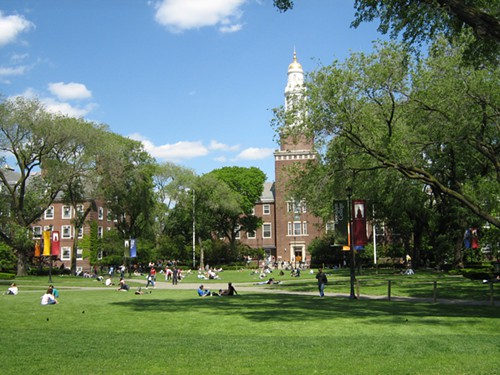MFA Students Speak: Is an MFA Worth It?

Erin Courtney, Playwright, Lecturer at Brooklyn College, 2013 Guggenheim Fellow
What were you doing when you decided to apply for the MFA? Where were you in life? And why an MFA?
I started playwriting from a genuine place of “play.” I was a painter, and playwriting was a side project that I did not take seriously. After ten years of writing, and a few downtown productions, I began to take my playwriting more seriously. As a result, my plays were leaning towards the seriously boring! So the question for me was: How could I expand my vision as a playwright, maintain the sense of freedom and playfulness but, at the same time, increase the rigor of the conversation around what theater can be? I was not interested in any old MFA, I specifically wanted to study with Mac Wellman because his work was challenging, new, expansive—smart but not dogmatic.
You earned your MFA at Brooklyn College, and now you’re a full-time lecturer there—how else has your degree advanced your professional career?
Many of the playwrights who have challenged me as a playwright and thinker I met through the MFA program, including my publisher, Karinne Keithley of 53rd State Press, who has championed so much strange and strong work. I also got to be a part of 13P. In many ways, I believe the reason I am in 13P is because Mac Wellman knew Anne Washburn, and he told her to check out my play Demon Baby. And this year I was awarded a Guggenheim Fellowship, and I would not have gotten that without my play A Map of Virtue which was published by 53rd State Press and produced by 13P. The MFA program at Brooklyn College, through Mac Wellman’s mentorship and vision, connects a diverse group of makers together, and this group truly inspires each other by example (through their own work) and with generosity (promoting each other through intelligent conversation and working with and for each other).
What’s interesting about you specifically is that when people throw around “MFA,” most people assume a fiction writer or poet. A lot of people lambast the MFA as a “factory” or “processing plant.” In other words, MFA grads can prefab a house, but don’t have any of the charm or provenance of heirlooms, no heart. So I’m curious if you find any truth in these accusations, or if we’re privileging fiction writers.
I think that can be true of playwriting MFA programs as well. That was not my experience at Brooklyn College, but I have many friends who went through playwriting programs and never had the experience of a true mentorship or a compassionate community. Another secret about Mac Wellman’s approach is that he has a real DIY attitude regarding production, publication, even in the way each student crafts their own curriculum for tutorial. Many programs infantilize the students and do not encourage them to be powerful. That’s a problem.
What disappointed you about your MFA experience, or left you wanting for more?
Nothing! That’s why I love teaching here: I am still learning from this great community of writers.
Is it worth it? If so, what would make it not worth the time and effort?
Here is what makes an MFA worth it:
1. Affordable tuition or, even better, tuition remission. Or even better, paid fellowships. Do not go into debt for an MFA.
2. Only go to an MFA program if there is a specific mentor or approach that you have sought out that matches your needs as a writer.
3. Go to grad school when you already have a good deal of creative work under your belt, so that you know some things already but you are also in a place of wanting to expand your vision, your process, and your stamina.
You might also like 



















